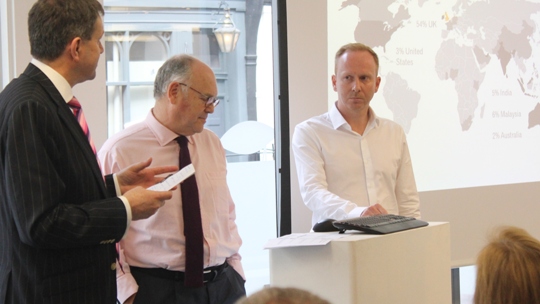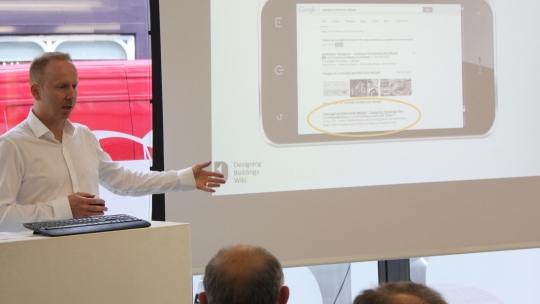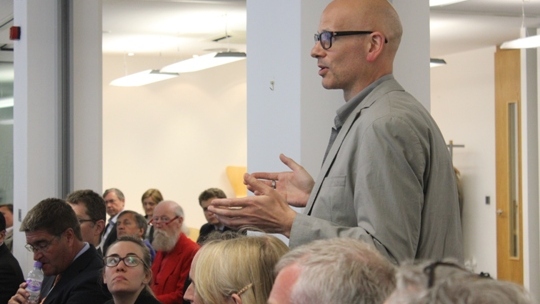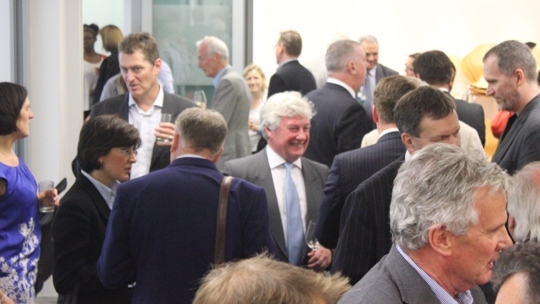Event celebrating two years of knowledge sharing
On 11 June 2014, industry leaders gathered in Buro Happold’s beautiful, central-London event space to celebrate the second year of Designing Buildings Wiki. The event was hosted by Buro Happold’s Andrew Comer.
[Image: Andrew Comer, Julian Barwick and Gregor Harvie]
Julian Barwick, Executive Director at Development Securities, kicked things off with a presentation in which he suggested long-awaited change might be about to hit the construction industry. Julian pointed out that construction hasn’t really progressed in the last 2,000 years. Whilst we have computers now, and steel, so we can build faster and more accurately, the basic techniques would be familiar to a Roman engineer. But perhaps now, we are on the threshold of a new world in which radical technologies disrupt the status quo. Moves to automate construction are gathering pace, and in 50 years' time we might all own nano-machines that can create anything at the touch of a button. Scarcity will then be a thing of the past. What impact will this have on the established order? How will abundance and automation change the structure of the industry? How will rapid innovation affect our need for information? Who will emerge as the winners and losers? Perhaps Roman engineers will be less comfortable in the world of 2064.
[Image: Gregor Harvie]
In his presentation, Gregor Harvie, co-founder of Designing Buildings Wiki, urged the industry to start exploiting the potential of digital media and stop creating ‘glossy’ pdf’s with copyright symbols on them as if we’re in the 16th century and have just published a book. We should be creating knowledge in an open format that allows it to be published anywhere and everywhere, so that as many people as possible can find it. We should make our knowledge as easy to use as possible; easy to understand, and with a licence allowing people to share it, reproduce it, copy it and improve it. He suggested that if the construction industry adopted a common standard for producing and publishing knowledge, it would make it easier to collaborate in its preparation, easier to find and share, and easier to carry forward from one project to another. He said that if the industry was to do just one thing, it should give every document it produces a unique identification number. At a stroke we would then be able to index the entirety of construction industry knowledge and search it by product, company, author, project and subject.
Harvie revealed that 46% of the users of Designing Buildings Wiki are from outside the UK and that their distribution around the world is an exact mirror of the places that employ UK consultants. The more accessible, useful and useable we can make our knowledge to people overseas, the more likely it is they will come to us when they are awarding contracts.
The presentations were followed by a lively debate, and conversations continued over drinks. Thank you to everyone that contributed to making it such a memorable evening. You can find more photos on Storify and Flickr and you can see the twitter feed that ran during the event at #dbwikido.
[Image: Paul Fletcher asking a question]
If you would like to be involved in developing a common standard for UK construction industry knowledge, please let us know by emailing [email protected].
Featured articles and news
Reform of the fire engineering profession
Fire Engineers Advisory Panel: Authoritative Statement, reactions and next steps.
Restoration and renewal of the Palace of Westminster
A complex project of cultural significance from full decant to EMI, opportunities and a potential a way forward.
Apprenticeships and the responsibility we share
Perspectives from the CIOB President as National Apprentice Week comes to a close.
The first line of defence against rain, wind and snow.
Building Safety recap January, 2026
What we missed at the end of last year, and at the start of this...
National Apprenticeship Week 2026, 9-15 Feb
Shining a light on the positive impacts for businesses, their apprentices and the wider economy alike.
Applications and benefits of acoustic flooring
From commercial to retail.
From solid to sprung and ribbed to raised.
Strengthening industry collaboration in Hong Kong
Hong Kong Institute of Construction and The Chartered Institute of Building sign Memorandum of Understanding.
A detailed description from the experts at Cornish Lime.
IHBC planning for growth with corporate plan development
Grow with the Institute by volunteering and CP25 consultation.
Connecting ambition and action for designers and specifiers.
Electrical skills gap deepens as apprenticeship starts fall despite surging demand says ECA.
Built environment bodies deepen joint action on EDI
B.E.Inclusive initiative agree next phase of joint equity, diversity and inclusion (EDI) action plan.
Recognising culture as key to sustainable economic growth
Creative UK Provocation paper: Culture as Growth Infrastructure.
Futurebuild and UK Construction Week London Unite
Creating the UK’s Built Environment Super Event and over 25 other key partnerships.
Welsh and Scottish 2026 elections
Manifestos for the built environment for upcoming same May day elections.
Advancing BIM education with a competency framework
“We don’t need people who can just draw in 3D. We need people who can think in data.”



























